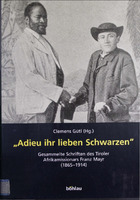"Adieu ihr lieben Schwarzen"
Gesammelte Schriften des Tiroler Afrika-Missionars Franz Mayr (1865-1914)
Author(s)
Gütl, Clemens
Collection
Austrian Science Fund (FWF)Language
GermanAbstract
Franz Mayr was "one of the most interesting of catholic missionaries in Southern Africa" states Professor Joy Brain ("University of Durban") in the foreword she wrote for this first edition of his writings. Mayr was born in the Austrian province of Tyrol in 1865, educated as a priest in the diocese of Brixen and arrived in Natal (South Africa) at the beginning of May 1890, inspired by the work being done there by the Trappist-Monks led by Abbot Franz Pfanner. Mayr was physically handicapped and soon left the trappists but just to offer his services to the vicar apostolic of Natal, Bishop Charles Jolivet, who accepted him for work among the African population. He was sent to Pietermaritzburg then capital of the British colony to take over the care of the African parishioners to bring the "good news" to those who had never heard it. He founded several new mission-stations in Natal, Southern Rhodesia (present day Zimbabwe) and Swaziland where he was killed by a native robber in 1914. Mayr - a man of many talents - was a gifted linguist, studied and published books in several African languages. He was interested in cultural anthropology and collected information about African customs. It is now more than a hundred years since Franz Mayr began his work of evangelisation and scholarship in Southern Africa. Publishing his letters and articles - kept by several archives in Europe - should help to remember a man of the Habsburg-Monarchy who went to preach the gospel to the so called heathen of Africa. Although Austria or Austria-Hungary never owned colonies in Africa many of its inhabitants left their homes to work in catholic mission-stations around the continent.
Several introductory chapters in this book explain the particular historical context which has to be put into consideration when reading Mayrs' writings. From there we learn about his life, his work, how he treated the native population, what he thought about other religious congregations around him, the colonialists and about troubles when trying to convince people to believe in the only - the "European God".
The missionary deserves to be better known. The present edition of historical sources is to be seen as a most relevant step allowing us to interpret his personality adequately. Als "einen der interessantesten katholischen Missionare im Südlichen Afrika" bezeichnet die Historikerin Joy Brain den Tiroler Priester Franz Mayr in ihrem Vorwort zu dieser umfangreichen Quellenedition. Die gesammelten, aus zahlreichen Archiven im In- und Ausland stammenden Schriften Mayrs, umfassen Briefe, Tagebucheinträge, Auszüge aus Chroniken, seine in Missions- und ethnologischen Zeitschriften und Tageszeitungen erschienenen Artikel sowie zahlreiche zeitgenössische Photographien.
Obwohl unser Land bzw. die Habsburger-Monarchie selbst keine Kolonien auf diesem Kontinent besaß, wirkte doch eine beträchtliche Anzahl von ihnen u. a. in katholischen Stationen. Ihre Rolle in der Interaktion mit der einheimischen Bevölkerung und die Wirkung ihrer Missionsartikel auf das Afrikabild ist bisher nahezu unerforscht geblieben. Mayr war nur einer jener Österreicher und Österreicherinnen, die im Zuge der katholischen Missionseuphorie des 19. und beginnenden 20. Jahrhunderts ausreisten, um Afrikaner und Afrikanerinnen zum Christentum zu "bekehren". Er wurde 1865 in der Osttiroler Gemeinde Nussdorf geboren und verbrachte seine Gymnasialzeit in Brixen, wo er auch das Priesterseminar absolvierte. Ab 1890 wirkte er in der ehemaligen britischen Kolonie Natal (Südafrika), in Südrhodesien (heutiges Zimbabwe) und in Swaziland, wo er 1914 einem Mordanschlag zum Opfer fiel. Unter seiner Leitung entstanden mehrere Missionsstationen u. a. das Projekt "Maryvale", ein Dorf für die einheimischen katholischen Zulus, heute ein Stadtteil von Pietermaritzburg.
Über die vorhandenen Quellen erhält man Einblick in den Alltag des Missionars, Informationen über Hemmnisse seiner Arbeit und über Erfolgserlebnisse, seine Einstellung zur afrikanischen Bevölkerung, zur jeweiligen Kolonialregierung, zu anderen Religionsgemeinschaften oder über seinen persönlichen Gemütszustand. F. Mayr schrieb mehrere Bücher in afrikanischen Sprachen, hatte ein Faible für Musik und Photographie und sammelte leidenschaftlich ethnologische Gegenstände, die er teilweise afrikanischen Museen überließ, teilweise für Ausstellungen nach Europa sandte. Erst kürzlich entdeckte man im Herbarium der "Universität von Natal" eine Pflanzensammlung, die er angelegt hatte. Sie wird derzeit von einer Gruppe von Wissenschaftlern ausgewertet und stellt eine der frühesten Dokumentationen über den Gebrauch von Heilpflanzen der Zulus dar. Fast neunzig Jahre nach seinem Tod scheint nun also das Interesse am Leben des Österreichers zuzunehmen.
Der wichtigste Schritt für die wissenschaftliche Bearbeitung seiner Biographie ist mit der vorliegenden Herausgabe seiner Schriften getan. Völlig in Vergessenheit geraten, soll durch die chronologisch angeordnete Herausgabe dieser Dokumente Mayrs Leben und Werk in Erinnerung gerufen werden. Zu ihrer Interpretierbarkeit bzw. zum besseren Verständnis sind den einzelnen Abschnitten Kapitel zum historischen Kontext vorangestellt.
Keywords
cultural anthropology; Africa; catholic missionar; Franz Mayr; Hochwohlgeboren; Pietermaritzburg; Priester (Christentum); Zulu (Volk)DOI
10.26530/oapen_437215ISBN
9783205771449OCN
607733058Publication date and place
Wien; München, 2004Grantor
Imprint
BöhlauClassification
Anthropology


 Download
Download